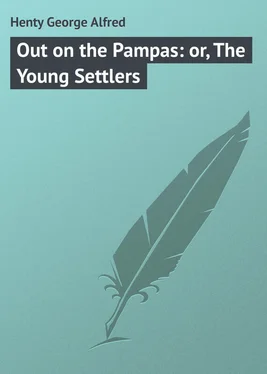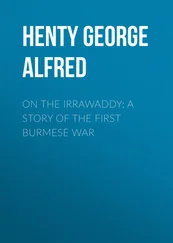George Henty - Out on the Pampas - or, The Young Settlers
Здесь есть возможность читать онлайн «George Henty - Out on the Pampas - or, The Young Settlers» — ознакомительный отрывок электронной книги совершенно бесплатно, а после прочтения отрывка купить полную версию. В некоторых случаях можно слушать аудио, скачать через торрент в формате fb2 и присутствует краткое содержание. Жанр: foreign_prose, foreign_children, на английском языке. Описание произведения, (предисловие) а так же отзывы посетителей доступны на портале библиотеки ЛибКат.
- Название:Out on the Pampas: or, The Young Settlers
- Автор:
- Жанр:
- Год:неизвестен
- ISBN:нет данных
- Рейтинг книги:5 / 5. Голосов: 1
-
Избранное:Добавить в избранное
- Отзывы:
-
Ваша оценка:
- 100
- 1
- 2
- 3
- 4
- 5
Out on the Pampas: or, The Young Settlers: краткое содержание, описание и аннотация
Предлагаем к чтению аннотацию, описание, краткое содержание или предисловие (зависит от того, что написал сам автор книги «Out on the Pampas: or, The Young Settlers»). Если вы не нашли необходимую информацию о книге — напишите в комментариях, мы постараемся отыскать её.
Out on the Pampas: or, The Young Settlers — читать онлайн ознакомительный отрывок
Ниже представлен текст книги, разбитый по страницам. Система сохранения места последней прочитанной страницы, позволяет с удобством читать онлайн бесплатно книгу «Out on the Pampas: or, The Young Settlers», без необходимости каждый раз заново искать на чём Вы остановились. Поставьте закладку, и сможете в любой момент перейти на страницу, на которой закончили чтение.
Интервал:
Закладка:
‘It is six miles square,’ he said, ‘that is, about 25,000 acres, and I bought it for about sixpence an acre. There is a good-sized stream runs through it; there are a good many trees, considering that it is out on the Pampas; there are several elevations which give a fine view over the plain, and upon one of these our future home will stand. A small stream falls into the larger one, and will, I think, be useful. There is an abundance of game; ducks, geese, and swans swarm upon the river. I saw a good many ostriches out on the plains. And, lastly, the soil appears to be excellent. A great point is, that it is only distant twenty miles from Rosario, a most rising town; so that the value of the land is sure to increase yearly, as new settlers come around us.’
‘That is a most important point,’ Mr. Thompson said. ‘Rosario is the most rising town in the country, and the land around it is certain to be very much sought after in a few years.’
‘Are there any settlements near, Frank?’ Mrs. Hardy asked.
‘The next plot to ours belongs to three young Englishmen, and the ground between us and Rosario is also principally occupied by English; so that we shall have neighbours near, and I do not suppose that it will be long before we have them all round us.’
‘If the advantages of the place are so great, Frank, how is it that you have got it so very cheaply? I understood from Mr. Thompson that land in a rising neighbourhood, and that was likely to increase in value, was worth two or three shillings, or even more, an acre.’
Mr. Hardy hesitated. ‘Well, Clara, the land is at present upon the extreme verge of the settlements, and the Indians are apt sometimes to be a little troublesome, and to drive off a few horses or cattle. No doubt the thing has been exaggerated; still there is something in it, and the consequence is, people are rather afraid to bid, and I have got this splendid tract of land for about £500; and, not improbably, in ten years it may be worth ten times as much.’
‘A great proportion of these Indian tales are built up upon very small foundations,’ Mr. Thompson said cheeringly; and Mrs. Hardy’s face, which had been a little serious, cleared up again, and in listening to her husband’s account of his travels, she forgot all about the Indians. The boys, however, by no means did so; and as they were going to bed, Charley said: ‘I think there is some chance of a row with the Indians, Hubert, for I noticed that Mr. Thompson looked grave when papa first said where he had bought the land. Depend upon it, we shall have some fun with them after all.’ They would have thought it still more likely had they heard the conversation between their father and Mr. Thompson after the ladies had gone to bed.
‘Why, my dear Hardy, how came you, with a wife and family, to think of buying land so exposed to the Indian attacks? Every season, when they come down, they sweep off the horses and cattle from the outlying settlements, and murder the people if they get a chance. I look upon it as madness.’
‘There is a good deal in what you say, Thompson, and I thought the whole matter over before I bought it. There is a risk – a great risk, if you like; but I hear the Indians seldom attack the houses of the settlers if they are well prepared and armed. They do occasionally, but very seldom. I shall be well prepared and well armed, and have therefore no fear at all for our personal safety. As to our animals, we must protect them as well as we can, and take our chance. It is only for two or three years at most. After that, we shall have settlements beyond and around us; and if emigration keeps on, as I anticipate, and if, as I believe, Rosario is to become a very large and important place, our land will eventually be worth £1 an acre, at the very lowest. I shall take care not to invest my whole capital in animals, so that I cannot be ruined in one blow. I think that, at the end of five years, you will agree with me that I have done wisely.’
‘I have no doubt that your property will increase very much in value, as you say, Hardy, and that, in the long run, your speculation will be a very successful one; but it is a terrible risk, I think.’
‘I do not think so, Thompson. We shall be a pretty strong party: we shall have certainly two men besides ourselves. The boys could bring down their man at three hundred yards, and I should do considerable execution among a body of Indians at six or seven; so I have no fear – not the least – in the world.’
In another two days Mr. Hardy and the boys, accompanied by Mr. Thompson, went down to Buenos Ayres, and took up their quarters at the hotel for a night. At parting, Mr. Thompson presented them with a couple of fine dogs, which he had bred from English mastiffs: Mr. Hardy had brought a brace of fine retrievers with him. Then, with a hearty adieu and much hand-shaking, they said ‘Good-bye’ as the steamer moved off from the shore. The heavy luggage was to follow in a sailing vessel upon the following day.
CHAPTER IV.
THE PAMPAS
THE voyage up the river Parana was marked by no particular incident. The distance to Rosario from Buenos Ayres is about two hundred and fifty miles, which was performed by the steamer in about a day and a half. The river is nearly twenty miles in breadth, and is completely studded by islands. The scenery is flat and uninteresting, and the banks but poorly wooded. Our travellers were therefore glad when they arrived at Rosario. The boys were disappointed at the aspect of the town, which, although a rising place, contained under a thousand inhabitants, and looked miserably poor and squalid after Buenos Ayres. Here they were met by a gentleman to whom Mr. Thompson had introduced Mr. Hardy, and with whom he had stayed on his first visit to Rosario. He had brought horses for themselves, and bullock-carts for their luggage.
‘What! are these your boys, Mr. Hardy? I had not expected to have seen such big fellows. Why, they will be men in no time.’
Charley and Hubert deserved Mr. Percy’s commendation. They were now sixteen and fifteen years old respectively, and were remarkably strong, well-grown lads, looking at least a year older than they really were. In a few minutes the luggage was packed in two bullock-carts, and they were on their way out to Mr. Percy’s station, which was about half-way to the camp of Mr. Hardy. The word camp in the Pampas means station or property; it is a corruption of the Spanish word campos , literally plains or meadows.
Here they found that Mr. Percy had most satisfactorily performed the commission with which Mr. Hardy had entrusted him. He had bought a couple of the rough country bullock-carts, three pair of oxen accustomed to the yoke, half a dozen riding horses, two milch cows, and a score of sheep and cattle to supply the larder. He had hired four men, – a stock-keeper named Lopez, who was called the capitaz or head man, a tall, swarthy fellow, whose father was a Spaniard, and whose mother a native woman; two labourers, the one a German, called Hans, who had been some time in the colony, the other an Irishman, Terence Kelly, whose face the boys remembered at once, as having come out in the same ship with themselves. The last man was an American, one of those wandering fellows who are never contented to remain anywhere, but are always pushing on, as if they thought that the farther they went, the better they should fare. He was engaged as carpenter and useful man, and there were few things to which he could not turn his hand. Mr. Hardy was pleased with their appearance; they were all powerful men, accustomed to work. Their clothes were of the roughest and most miscellaneous kind, a mixture of European and Indian garb, with the exception of Terence, who still clung to the long blue-tailed coat and brass buttons of the ‘ould country.’
Читать дальшеИнтервал:
Закладка:
Похожие книги на «Out on the Pampas: or, The Young Settlers»
Представляем Вашему вниманию похожие книги на «Out on the Pampas: or, The Young Settlers» списком для выбора. Мы отобрали схожую по названию и смыслу литературу в надежде предоставить читателям больше вариантов отыскать новые, интересные, ещё непрочитанные произведения.
Обсуждение, отзывы о книге «Out on the Pampas: or, The Young Settlers» и просто собственные мнения читателей. Оставьте ваши комментарии, напишите, что Вы думаете о произведении, его смысле или главных героях. Укажите что конкретно понравилось, а что нет, и почему Вы так считаете.












